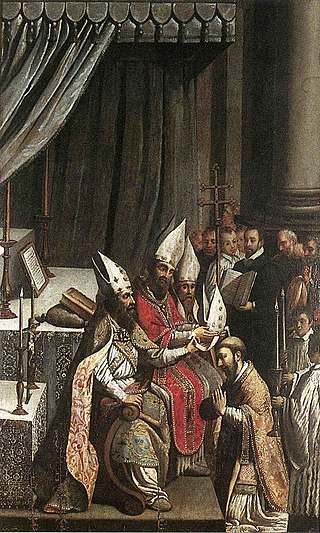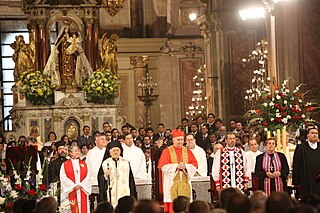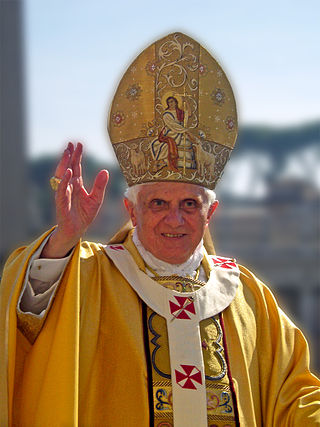
Apostolic succession is the method whereby the ministry of the Christian Church is considered by some Christian denominations to be derived from the apostles by a continuous succession, which has usually been associated with a claim that the succession is through a series of bishops. Those of the Catholic, Eastern Orthodox, Scandinavian Lutheran, Anglican, Oriental Orthodox, Church of the East, Hussite, Moravian, and Old Catholic traditions maintain that "a bishop cannot have regular or valid orders unless he has been consecrated in this apostolic succession". These traditions do not always consider the episcopal consecrations of all of the other traditions as valid.
Full communion is a communion or relationship of full agreement among different Christian denominations or Christian individuals that share certain essential principles of Christian theology. Views vary among denominations on exactly what constitutes full communion, but typically when two or more denominations are in full communion it enables services and celebrations, such as the Eucharist, to be shared among congregants or clergy of any of them with the full approval of each.

In Christian denominations that practice infant baptism, confirmation is seen as the sealing of the covenant created in baptism. Those being confirmed are known as confirmands. For adults, it is an affirmation of belief. The ceremony typically involves laying on of hands.

Open communion is the practice of some Protestant Churches of allowing members and non-members to receive the Eucharist. Many but not all churches that practice open communion require that the person receiving communion be a baptized Christian, and other requirements may apply as well. In Methodism, open communion is referred to as the open table, meaning that all may approach the Communion table.

Holy Communion, also known as the Eucharist and the Lord's Supper, is a Christian rite that is considered a sacrament in most churches. The elements of the rite are sacramental bread and wine.
Apostolicae curae is the title of an apostolic letter, issued in 1896 by Pope Leo XIII, declaring all Anglican ordinations to be "absolutely null and utterly void". The Anglican Communion made no official reply, but the archbishops of Canterbury and York of the Church of England published a response known by its Latin title Saepius officio in 1897.
Catholicity is a concept pertaining to beliefs and practices that are widely accepted by numerous Christian denominations, most notably by those Christian denominations that describe themselves as catholic in accordance with the Four Marks of the Church, as expressed in the Nicene Creed formulated at the First Council of Constantinople in 381: "[I believe] in one, holy, catholic, and apostolic Church." The English adjective catholic is derived from the Ancient Greek adjective καθολικός, meaning "general", "universal". Thus, "catholic" means that in the Church the wholeness of the Christian faith, full and complete, all-embracing, and with nothing lacking, is proclaimed to all people without excluding any part of the faith or any class or group of people. An early definition for what is "catholic" was summarized in what is known as the Vincentian Canon in the 5th century Commonitory: "what has been believed everywhere, always, and by all."

The Catholic Church has engaged in the modern ecumenical movement especially since the Second Vatican Council (1962–1965) and the issuing of the decree Unitatis redintegratio and the declaration Dignitatis humanae. It was at the Council that the Pontifical Council for Promoting Christian Unity was created. Those outside of the Catholic Church were categorised as heretics or schismatics, but in many contexts today, to avoid offence, the euphemism "separated brethren" is used.
Subsistit in is a Latin phrase which appears in Lumen gentium, the document on the church from the Second Vatican Council of the Catholic Church. Since the council, the reason for use of the term "subsists in" rather than simply "is" has been disputed. Generally, those who see little or no change in church teaching in Vatican II insist on the equivalence of subsistit in and "is". Those who point to a new, ecumenical thrust in Vatican II insist that the term was introduced as a compromise after much discussion, and acknowledges new elements in the council's teaching.
Branch theory is an ecclesiological proposition that the One, Holy, Catholic, and Apostolic Church includes various different Christian denominations whether in formal communion or not. The theory is often incorporated in the Protestant notion of an invisible Christian Church structure binding them together.

The priesthood is the office of the ministers of religion, who have been commissioned ("ordained") with the Holy orders of the Catholic Church. Technically, bishops are a priestly order as well; however, in layman's terms priest refers only to presbyters and pastors. The church's doctrine also sometimes refers to all baptised (lay) members as the "common priesthood", which can be confused with the ministerial priesthood of the consecrated clergy.
The historic or historical episcopate comprises all episcopates, that is, it is the collective body of all the bishops of a group who are in valid apostolic succession. This succession is transmitted from each bishop to their successors by the rite of Holy Orders. It is sometimes subject of episcopal genealogy.

Pope Benedict XVI, who led the Roman Catholic Church as Pope from 2005 to 2013, continued manoeuvring the Church through the dynamics of modernity, which the Church had begun engaging in with the Second Vatican Council. Because the question of religious pluralism is a key issue raised by modernity, ecumenism, the establishment of harmony and dialogue between the different Christian denominations, is a significant concern of a post Second Vatican Council Church. Pope Benedict XVI's approach has been characterised as leaning toward the conservative while still being expansive and engaged, involving the full breadth of Christendom, including the Orthodox Churches and Protestant churches, as well as freshly engaging with other Christian bodies considered by Roman Catholics to be more heterodox, such as the Church of Jesus Christ of Latter-day Saints.
The canonical situation of the Society of Saint Pius X (SSPX), a group founded in 1970 by Archbishop Marcel Lefebvre, is unresolved. The Society of Saint Pius X has been the subject of much controversy since 1988, when Bernard Fellay, Bernard Tissier de Mallerais, Richard Williamson and Alfonso de Galarreta were illicitly consecrated as bishops at Ecône, at the International Seminary of Saint Pius X, in violation of canon law. Lefebvre and the four other SSPX bishops individually incurred a disciplinary latae sententiae excommunication for this schismatic act. The excommunications of the four living SSPX bishops were remitted in 2009.
Sister churches was a term used in 20th-century ecclesiology to describe ecumenical relations between the Roman Catholic Church and the Eastern Orthodox Churches, and more rarely and unofficially, between the Roman Catholic Church and the Anglican communion. The Catholic Church has since called on theologians to avoid the term, clarifying that "one cannot properly say that the Catholic Church is 'sister' of a particular Church or group of Churches. This is not merely a question of terminology, but above all of respecting a basic truth of the Catholic faith: that of the unicity [uniqueness] of the [Catholic Church]." The term is also currently used among Protestants to refer to different denominations of the same religious tradition.
A personal ordinariate for former Anglicans, shortened as personal ordinariate or Anglican ordinariate, is a canonical structure within the Catholic Church established in order to enable "groups of Anglicans" and Methodists to join the Catholic Church while preserving elements of their liturgical and spiritual patrimony.
This is a glossary of terms used within the Catholic Church. Some terms used in everyday English have a different meaning in the context of the Catholic faith, including brother, confession, confirmation, exemption, faithful, father, ordinary, religious, sister, venerable, and vow.
Separated brethren is a term sometimes used by the Catholic Church and its clergy and members to refer to baptized members of other Christian traditions. The phrase is a translation of the Latin phrase fratres seiuncti. It is largely used as a polite euphemism in contexts where the terms "formal heretics" or "material heretics" might cause offense.
The role of a Catholic catechist is to catechize the faith of the Catholic Church by both word and example. The Directory for Catechesis states that faith must be "known, celebrated, lived, and turned into prayer" in a personal and total encounter of the heart, mind and senses with Christ. St. John Paul II describes the aim of catechesis as putting "people not only in touch but in communion, in intimacy, with Jesus Christ."

Criticism of Protestantism covers critiques and questions raised about Protestantism, the Christian denominations which arose out of the Protestant Reformation. While critics may praise some aspects of Protestantism which are not unique to the various forms of Protestantism, Protestantism is faced with criticism mainly from the Catholic Church and the Eastern Orthodox Church, although Protestant denominations have also engaged in self-critique and criticized one another. According to both the Catholic Church and Eastern Orthodoxy, many major, foundational Protestant doctrines have been officially declared heretical.







